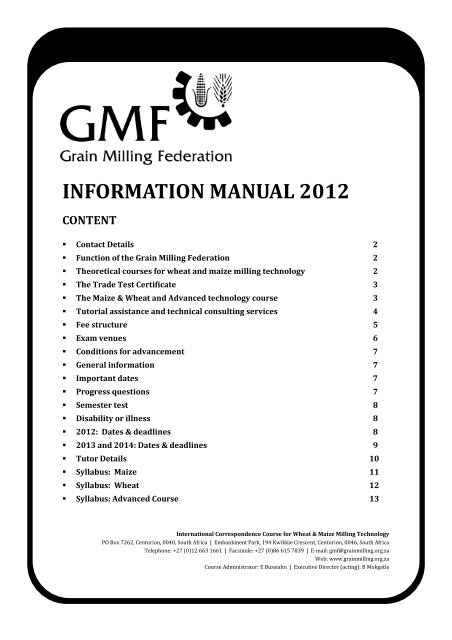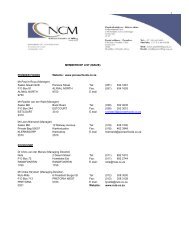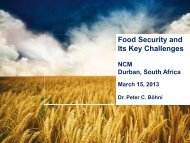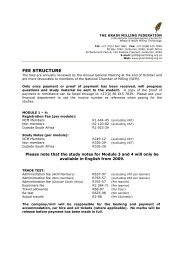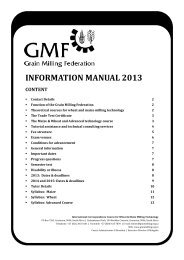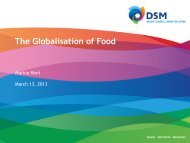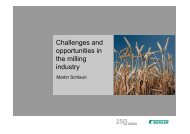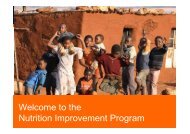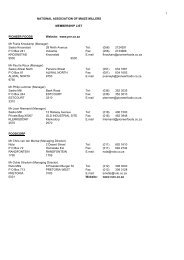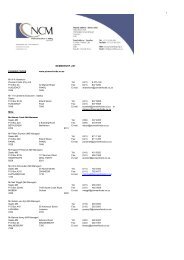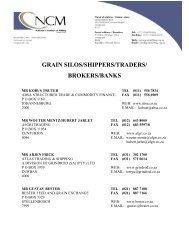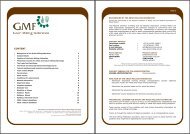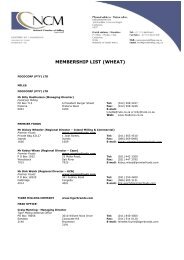information manual 2012 - National Chamber of Milling
information manual 2012 - National Chamber of Milling
information manual 2012 - National Chamber of Milling
You also want an ePaper? Increase the reach of your titles
YUMPU automatically turns print PDFs into web optimized ePapers that Google loves.
INFORMATION MANUAL <strong>2012</strong><br />
CONTENT<br />
Contact Details 2<br />
Function <strong>of</strong> the Grain <strong>Milling</strong> Federation 2<br />
Theoretical courses for wheat and maize milling technology 2<br />
The Trade Test Certificate 3<br />
The Maize & Wheat and Advanced technology course 3<br />
Tutorial assistance and technical consulting services 4<br />
Fee structure 5<br />
Exam venues 6<br />
Conditions for advancement 7<br />
General <strong>information</strong> 7<br />
Important dates 7<br />
Progress questions 7<br />
Semester test 8<br />
Disability or illness 8<br />
<strong>2012</strong>: Dates & deadlines 8<br />
2013 and 2014: Dates & deadlines 9<br />
Tutor Details 10<br />
Syllabus: Maize 11<br />
Syllabus: Wheat 12<br />
Syllabus: Advanced Course 13<br />
International Correspondence Course for Wheat & Maize <strong>Milling</strong> Technology<br />
PO Box 7262, Centurion, 0040, South Africa | Embankment Park, 194 Kwikkie Crescent, Centurion, 0046, South Africa<br />
Telephone: +27 (0)12 663 1661 | Facsimile: +27 (0)86 615 7839 | E-mail: gmf@grainmilling.org.za<br />
Web: www.grainmilling.org.za<br />
Course Administrator: E Bussiahn | Executive Director (acting): B Mokgatle
Page 2<br />
CONTACT DETAILS<br />
Telephone number : +27 (0)12 663 1660/1<br />
Fax number : +27 (0)86 615 7839<br />
E-mail address : elmien@grainmilling.org.za<br />
Website address : www.grainmilling.org.za<br />
Postal address<br />
Physical address<br />
PO Box 7262<br />
Embankment Park<br />
CENTURION<br />
194 Kwikkie Crescent<br />
0046 CENTURION<br />
SOUTH AFRICA<br />
Please note that no progress questions may be posted to the postal address.<br />
Please make use <strong>of</strong> your company’s courier service to deliver the assignments to the physical<br />
address.<br />
CONTACT PERSON FOR THE ADMINISTRATION<br />
COURSE ADMINISTRATOR : Elmien Bussiahn<br />
FUNCTION OF THE GRAIN MILLING FEDERATION<br />
- Administer theoretical training through correspondence courses (distance education model)<br />
for wheat and maize milling technology.<br />
- Administer the practical trade test for would be millers.<br />
- Administer the advanced course.<br />
- Administer tutorial assistance and technical consulting services.<br />
THEORETICAL COURSES FOR WHEAT AND MAIZE MILLING TECHNOLOGY<br />
The primary aim <strong>of</strong> these courses is to focus on and establish key competencies and skills for<br />
problem solving and decision making in wheat and maize milling situations. These courses<br />
consist <strong>of</strong> four modules each and contain theoretical <strong>information</strong> for wheat and maize milling<br />
technology.<br />
Tuition is through the medium <strong>of</strong> distance education, i.e. a correspondence course.<br />
The Grain <strong>Milling</strong> Federation provides a tutor for each course to assist learners with questions<br />
they might have regarding the course material.<br />
However, it is imperative that learners who follow milling as a career have a mentor<br />
(experienced miller/mill manager) to assist and guide them.<br />
A Grain <strong>Milling</strong> Federation tutor will be responsible for the compilation and marking <strong>of</strong> the<br />
progress assignments and semester examinations.
Page 3<br />
THE TRADE TEST CERTIFICATE<br />
After successfully completing module 4 <strong>of</strong> the technology course, the learner (under<br />
mentorship) should spend a further six months in a programme relieving the shift miller<br />
where the theory and practical components are applied in experiential “on-the-job”<br />
learning.<br />
Once the mentor (experienced miller/mill manager) is satisfied that the learner is<br />
competent in the aspects <strong>of</strong> milling technology, he can apply to the Course Administrator to<br />
have the learner Trade Tested.<br />
The Course Administrator will arrange a suitable date for the practical Trade Test that will<br />
take ± two days per learner and will be conducted by one <strong>of</strong> the Grain <strong>Milling</strong> Federation’s<br />
Trade Test examiners.<br />
Wheat and maize technology courses are not inter-changeable i.e. a maize technology<br />
course, for example, will only give the student access to do the practical trade test for maize<br />
milling.<br />
The practical Trade Test will be conducted in the mill where the learner had undergone<br />
their training. The learner will be issued, well in advance <strong>of</strong> the actual Trade Test date, with<br />
detailed <strong>information</strong> on the topics that the examiner will use to test his/her competency.<br />
THE MAIZE & WHEAT AND ADVANCED TECHNOLOGY COURSE<br />
The Advanced Technology Course in wheat and maize milling has no specific outcome or<br />
<strong>National</strong> Qualification i.e. head miller or mill manager, and was:<br />
- Firstly, introduced for the purpose <strong>of</strong> upgrading existing general management:<br />
to focus on and establish key competencies and skills to structure the relationship<br />
between the business functions;<br />
to focus on and establish key competencies and skills for problem-solving and<br />
decision-making in managerial situations; and<br />
to establish key competencies and skills for steering and directing operations.<br />
- Secondly, to provide a preparation opportunity for persons with the necessary drive<br />
and inclination and in possession <strong>of</strong> a wheat or maize trade test certificate to move into<br />
management positions in the wheat and maize milling industry.<br />
Persons with a wheat or maize Grain <strong>Milling</strong> Federation Trade Test Certificate can enrol for<br />
this course. A letter <strong>of</strong> approval from the particular general manager or mill manager must<br />
accompany the application.<br />
A pass mark <strong>of</strong> 50% is required in the progress questions as well as the semester test.<br />
Learners will have to pass both chapters <strong>of</strong> a module before progressing on to the next<br />
module but will be given credit for the one he/she passed.
Page 4<br />
TUTORIAL ASSISTANCE AND TECHNICAL CONSULTING SERVICES<br />
The Grain <strong>Milling</strong> Federation can now <strong>of</strong>fer the student on-the-spot tutorial<br />
assistance during the semester.<br />
- The purpose <strong>of</strong> this service is to:<br />
prepare the learners for the semester test by ensuring that he/she<br />
understands the subject matter covered in the module. This can be done<br />
preferable before the progress questions are due to be handed in, or just<br />
prior to the examination;<br />
<br />
prepare the candidates for the Trade Test.<br />
- The Grain <strong>Milling</strong> Federation will make use <strong>of</strong> the skilled group <strong>of</strong> tutors who<br />
have made themselves available for this work.<br />
- Tuition will be conducted either at the learners’ mill or at a central venue.<br />
- Duration <strong>of</strong> the tuition would be dependent on the number <strong>of</strong> learners as well as<br />
the number <strong>of</strong> modules to be covered.<br />
- It would be impossible for the tutor to cover the entire contents <strong>of</strong> each module.<br />
It would be a requirement that the learner make a list <strong>of</strong> items he/she requires<br />
tuition in and forward it to the Grain <strong>Milling</strong> Federation at least two weeks<br />
before the training session.<br />
- The above list should be compiled in such a matter that the subjects be listed in<br />
order <strong>of</strong> significance. This would give the tutor time to prepare the necessary<br />
material to present at the session.<br />
- Course material, such as writing equipment, flipcharts, textbooks, etc. will be the<br />
responsibility <strong>of</strong> the respective milling concerned.<br />
- The learners’ training <strong>of</strong>ficer/manager should make a request for tutorial<br />
assistance in advance. This should be forwarded directly to the Grain <strong>Milling</strong><br />
Federation's Course Administrator.
Page 5<br />
FEE STRUCTURE<br />
The fees are annually reviewed by the Annual General Meeting at the end <strong>of</strong> October.<br />
Only once payment or pro<strong>of</strong> <strong>of</strong> payment has been received, will progress questions<br />
and study material be sent to the student. A copy <strong>of</strong> the pro<strong>of</strong> <strong>of</strong> payment or remittance<br />
can be faxed through to +27(0) 86 615 7839. Please ask your financial department to use<br />
the invoice number as reference when paying for the studies.<br />
MODULE 1 – 4:<br />
Registration Fee (Per Module):<br />
NCM Members R1 444-45 (excluding VAT)<br />
Non-members R2 226-82 (excluding VAT)<br />
Outside South Africa R3 069-45<br />
Study Notes (per module):<br />
NCM Members R249-12 (excluding VAT)<br />
Non-members R336-29 (excluding VAT)<br />
Outside South Africa R336-29<br />
TRADE TEST:<br />
Administration fee (NCM Members) R637-97 (excluding VAT per learner)<br />
Administration fee (Non-members) R672-57 (excluding VAT per learner)<br />
Administration fee (Outside South Africa) R672-57 (Per learner)<br />
Examiners fee R2 384-71 (Per learner)<br />
Travel allowance R68-87 (Per hour)<br />
Re-test R625-98 (Per section)<br />
Actual travels R3-05 (Per kilometer)<br />
The company/mill will be responsible for the booking and payment <strong>of</strong><br />
accommodation, car hire and air tickets (where applicable). No marks will be release<br />
before payment has been made in full.<br />
ADVANCED COURSE:<br />
Registration Fee (per module):<br />
NCM Members R2 120-82 (excluding VAT)<br />
Non-members R3 189-83 (excluding VAT)<br />
Outside South Africa R4 273-16<br />
Study Notes (per module):<br />
NCM Members R498-22 (excluding VAT)<br />
Non-members R672-57 (excluding VAT)<br />
Outside South Africa R672-57
i<br />
Page 6<br />
TUTORIAL ASSISTANCE<br />
Administration fee (NCM Members ) R131-48 (excluding VAT per learner)<br />
Administration fee (Non-members) R197-21 (excluding VAT per learner)<br />
Administration fee (Outside South Africa) R197-21 (Per learner)<br />
Examiners fee R1 753-33 (Per day)<br />
Travel allowance R75-76 (Per hour)<br />
Actual travels R3-05 (Per kilometer)<br />
The company/mill will be responsible for the booking and payment <strong>of</strong><br />
accommodation, car hire and air tickets (where applicable).<br />
Other costs:<br />
Change and cancellation cost R522-50 (excluding VAT)<br />
Cancellation <strong>of</strong> Trade Test cost R522-50 (excluding VAT)<br />
Issue a duplicate certificate R75-00 (excluding VAT)<br />
Marking <strong>of</strong> progress questions R234-99 (excluding VAT)<br />
ALL THE MODULES ARE AVAILABLE FOR PURCHASE BY ANYONE, BESIDES LEARNERS,<br />
AND SHOULD BE A VALUABLE ADDITION TO ANY MILLING TECHNOLOGY LIBRARY<br />
EXAM VENUES<br />
Exam venues are available in the following locations:<br />
• Bloemfontein<br />
• Botswana<br />
• KwaZulu-Natal<br />
• Kroonstad<br />
• Lichtenburg<br />
• Mozambique<br />
• Namibia (Windhoek)<br />
• Paarl<br />
• Polokwane<br />
• Port Elizabeth<br />
• Pretoria<br />
• Upington<br />
• Zambia<br />
• Zimbabwe<br />
Learners will be informed <strong>of</strong> the exact location <strong>of</strong> the exam venue via sms and on our<br />
website. Learners are advised to make prior arrangements for accommodation and<br />
travelling to the nearest exam venue in their province.
Page 7<br />
CONDITIONS FOR ADVANCEMENT<br />
Progress questions must be completed and returned to the Grain <strong>Milling</strong> Federation. A pass mark<br />
<strong>of</strong> 50% must be obtained to qualify for the examination. If the learner fails the progress questions,<br />
he/she will have to re-register for the specific module.<br />
The semester test is written at the end <strong>of</strong> each study semester and the learner must pass this test<br />
(50% pass mark) to advance to the next module. In addition, the leaner must obtain a 50% pass<br />
mark for the compulsory questions.<br />
GENERAL INFORMATION<br />
Interested candidates can register for the wheat and maize milling technology courses but as this<br />
is a technology course, assignments and examinations will contain questions requiring practical<br />
experience/exposure in the wheat and maize industry.<br />
- The entry level for enrolment for this course is grade 10 (Std 8) and pro<strong>of</strong> <strong>of</strong> qualification is<br />
required on registering.<br />
- Learners are requested not to contact The Grain <strong>Milling</strong> Federation directly but to<br />
work through their mill manager/training <strong>of</strong>ficers.<br />
- Learners must use their student number for all correspondence and enquiries.<br />
- The medium <strong>of</strong> course material and tuition will be in English or Afrikaans.<br />
- Passing the progress assignment (50%) is a prerequisite for entrance to write the end <strong>of</strong><br />
semester examination. Unsuccessful learners will have to re-register for the failed course the<br />
next semester.<br />
- Only module 1 and 2 may be done simultaneously with written consent <strong>of</strong> the learner’s mill<br />
manager/mentor. If module 1 is failed in the exam, the learner fails both modules. (Module 1<br />
has to be completed before module 2).<br />
- All learners have to start at module 1 and progress from there. The wheat and maize<br />
courses are separate technology courses.<br />
- Separate certificates for the wheat and maize courses in milling technology will be issued to<br />
learners who successfully completed them.<br />
IMPORTANT DATES<br />
- The first semester starts on 9 January and the closing date for registration is 3 February.<br />
The deadline for completed assignments from learners is 9 March.<br />
The semester examination takes place on Wednesday, 9 May at designated venues. The<br />
semester ends when learners have been notified <strong>of</strong> their results.<br />
- The second semester starts on 9 July and the closing date for registration is 3 August The<br />
deadline for completed assignments from learners is 31 August.<br />
The semester examination takes place on Wednesday, 14 November at designated venues.<br />
The semester ends when learners have been notified <strong>of</strong> their results.<br />
PROGRESS QUESTIONS<br />
- Questions are set on each chapter <strong>of</strong> the study notes and marks allocated accordingly. The<br />
answers to the progress questions must be submitted to the Grain <strong>Milling</strong> Federation in<br />
accordance with the instructions forwarded with the questions. The marks attained will be<br />
accumulated towards the minimum marks required for the learner to qualify to take the<br />
semester test.<br />
- The minimum qualifying mark is 50% <strong>of</strong> the total available marks for all the chapters <strong>of</strong> that<br />
module <strong>of</strong> the course.<br />
- The questions are based mainly on the study notes and practical learning acquired in the<br />
milling environment.<br />
- The semester test will be very similar to the progress questions.
Page 8<br />
SEMESTER TEST<br />
If the learner have complied with the requirement in respect <strong>of</strong> progress questions as set out above,<br />
they will be permitted to take the semester test. The duration there<strong>of</strong> is 3 hours, at a suitable<br />
examination centre, convenient to the majority <strong>of</strong> learners in a general province, supervised by an<br />
invigilator, under strict examination conditions. Questions for the examination will be based on the<br />
theoretical and practical aspects in all the study material covered to date.<br />
DISABILITY OR ILLNESS DURING EXAMS<br />
The Grain <strong>Milling</strong> Federation must be informed in writing, with supporting medical evidence or a<br />
doctor’s certificate, as soon as possible after the examination date, <strong>of</strong> the reasons why the candidate<br />
were unable to write the examination. In this event, the learner will be permitted to write the exam<br />
the following semester without having to do the progress questions again. An administration fee<br />
will be payable for writing the next semester’s examination paper.<br />
If the learner is unable to write the examinations on the specified date, we request the training<br />
<strong>of</strong>ficer/mentor to contact the Grain <strong>Milling</strong> Federation at least a week before the examination date<br />
to make alternative arrangements. An administration fee will be payable if the learner wishes to<br />
continue in the next semester.<br />
THEORY COURSE<br />
DATES AND DEADLINES: <strong>2012</strong><br />
<strong>2012</strong><br />
Semester 1<br />
<strong>2012</strong><br />
Semester 2<br />
Semester starts 9 January 9 July<br />
Closing date for registration and payments in respect <strong>of</strong> study<br />
notes<br />
3 February 6 August<br />
Closing date for changes or cancellations <strong>of</strong> studies 10 February 13 August<br />
Closing date for progress questions to be received by The<br />
Grain <strong>Milling</strong> Federation<br />
9 March 31 August<br />
Date <strong>of</strong> semester test (All modules) 9 MAY 14 NOVEMBER<br />
Semester finishes 22 June 12 December<br />
- Please make sure that the application forms are completed in full. Each “New Learner<br />
Application” form must be accompanied by an “Application for an Invoice” form.<br />
- No study notes or progress questions will be couriered/e-mailed to learners, unless payment or<br />
pro<strong>of</strong> <strong>of</strong> payment has been received by the Grain <strong>Milling</strong> Federation.<br />
- An administration fee will be charged for changes or cancellation <strong>of</strong> studies. No fees will be<br />
refunded after the given date.<br />
- It is the responsibility <strong>of</strong> the learner to ensure that The Grain <strong>Milling</strong> Federation received their<br />
progress questions on the specified date. Please allow enough time for the courier service when<br />
sending the progress questions.
Page 9<br />
THEORY COURSE<br />
DATES AND DEADLINES: 2013<br />
2013*<br />
Semester 1<br />
2013*<br />
Semester 2<br />
Semester starts 7 January 8 July<br />
Closing date for registration and payments in respect<br />
<strong>of</strong> study notes<br />
1 February 9 August<br />
Closing date for changes or cancellations <strong>of</strong> studies 8 February 16 August<br />
Closing date for progress questions to be received<br />
by The Grain <strong>Milling</strong> Federation<br />
8 March 6 September<br />
Date <strong>of</strong> semester test (All modules) 8 MAY 13 NOVEMBER<br />
Semester finishes 21 June 13 December<br />
* Please note that these dates are subject to change<br />
THEORY COURSE<br />
DATES AND DEADLINES: 2014<br />
2014*<br />
Semester 1<br />
2014*<br />
Semester 2<br />
Semester starts 13 January 7 July<br />
Closing date for registration and payments in respect<br />
<strong>of</strong> study notes<br />
7 February 8 August<br />
Closing date for changes or cancellations <strong>of</strong> studies 14 February 15 August<br />
Closing date for progress questions to be received<br />
by The Grain <strong>Milling</strong> Federation<br />
7 March 5 September<br />
Date <strong>of</strong> semester test (All modules) 14 MAY 12 NOVEMBER<br />
Semester finishes 30 June 12 December<br />
* Please note that these dates are subject to change
Page 10<br />
TUTOR CONTACT DETAILS<br />
MODULE TUTOR CONTACT NUMBER<br />
Maize 1<br />
Maize 2<br />
Klaas Dumas (Afr)<br />
Jaco Venter (Eng)<br />
Joe<br />
Maluka<br />
(012) 308 3017/(012) 308 3000<br />
klaas@ruto.co.za/jaco@ruto.co.za<br />
(012) 842 8118<br />
Joe.Maluka2@Premierfoods.com<br />
Maize 3<br />
Percy<br />
Fell<br />
(011) 673 1677<br />
percyfell@telkomsa.net<br />
Maize 4<br />
Ronnie<br />
Luff<br />
(039) 975-9639<br />
ronnie@absamail.co.za<br />
Wheat 1<br />
Wheat 2<br />
Wheat 3<br />
Klaas Dumas (Afr)<br />
Jaco Venter (Eng)<br />
Nico Carelse<br />
Gavin Vincent<br />
Neels<br />
van der Linde<br />
(012) 308 3017/(012) 308 3000<br />
klaas@ruto.co.za/jaco@ruto.co.za<br />
(018) 632 5037/082 817 2804<br />
headmiller@nwk.co.za<br />
(012) 663 5215<br />
gvincent@pridemilling.co.za<br />
(011) 432 4778<br />
Wheat 4<br />
Advanced 1(1)<br />
Tony<br />
Elliott<br />
Tony<br />
Elliott<br />
(011) 763 3886<br />
tonye@yebo.co.za<br />
(011) 763 3886<br />
tonye@yebo.co.za<br />
Advanced 1(2)<br />
Klaas<br />
Dumas<br />
(012) 308 3017<br />
klaas@ruto.co.za<br />
Advanced 2(3)<br />
Lyn<br />
Ogston<br />
072 259 8324<br />
lyn.ogston@gmail.com<br />
Advanced 2(4)<br />
Percy<br />
Fell<br />
(011) 673 1677<br />
percyfell@telkomsa.net<br />
Advanced 3(5)<br />
Neels<br />
van der Linde<br />
(011) 432 4778<br />
Advanced 3(6)<br />
Marina<br />
Lourens<br />
(021) 872 2580<br />
marienal@bassonblackburn.com<br />
Advanced 4(7)<br />
Ronnie<br />
Luff<br />
(039) 975-9639<br />
ronnie@absamail.co.za<br />
Advanced 4(8)<br />
Ronnie<br />
Luff<br />
(039) 975-9639<br />
ronnie@absamail.co.za
Page 11<br />
SYLLABUS MAIZE MILLING<br />
MODULE 1<br />
• Occupational safety<br />
• The importance <strong>of</strong> maize as a crop and a source <strong>of</strong> food<br />
• Growth and development <strong>of</strong> the maize plant<br />
• Plant classification <strong>of</strong> maize: Structure and physical characteristics <strong>of</strong> the maize<br />
kernel<br />
• Grading regulations<br />
• Receiving maize in bulk and in bags<br />
• Handling <strong>of</strong> maize in bulk and bags<br />
• Storing maize in bulk and in bags<br />
• Mass measurement<br />
• Fumigation<br />
MODULE 2<br />
• Industrial safety and silo operating (general)<br />
• Preparation <strong>of</strong> maize for milling<br />
• Grain flow control<br />
• Maize conditioning<br />
• Sequence and layout <strong>of</strong> machines in the maize screenroom<br />
• Treatment and disposal <strong>of</strong> impurities<br />
MODULE 3<br />
• Occupational safety<br />
• Outline <strong>of</strong> the maize milling process<br />
• Roller mills<br />
• Reels, centrifugals and plansifters<br />
• Purifiers<br />
• Centrifugal type drum sifters<br />
• Degerminators<br />
• The concentrator<br />
• The maize germ dryer<br />
• Germ meal pelleting<br />
• Vibratory sifters<br />
• Flake breakers<br />
• Pneumatic conveying<br />
MODULE 4<br />
• Hygiene, health and safety<br />
• Outline <strong>of</strong> the maize milling process<br />
• The degermination process<br />
• Roll flute specifications used in maize milling<br />
• Break and reduction roll systems<br />
• The germ roll system<br />
• Flowsheet principles and mill balance<br />
• Plantsifter internal flow schemes<br />
• Meal blending, divides and maize products<br />
• Maize germ meal processing<br />
• Duties <strong>of</strong> a shift miller<br />
• Calculations<br />
• Infestation control in the mill
Page 12<br />
SYLLABUS WHEAT MILLING<br />
MODULE 1<br />
• Occupational safety<br />
• The importance <strong>of</strong> wheat as a crop and a source <strong>of</strong> food<br />
• Growth and development <strong>of</strong> the wheat plant<br />
• Structure <strong>of</strong> the wheat kernel and the physical characteristics <strong>of</strong> wheat<br />
• Grading regulations<br />
• Receiving wheat in bulk and in bags<br />
• Handling <strong>of</strong> wheat in bulk and bags<br />
• Storing wheat in bulk and in bags<br />
• Mass measurement<br />
• Fumigation<br />
MODULE 2<br />
• Silo operating<br />
• Company based wheat grouping systems<br />
• Industrial safety (general)<br />
• Preparation <strong>of</strong> wheat for milling: Removal <strong>of</strong> impurities<br />
• Preparation <strong>of</strong> wheat for milling: Grain flow control<br />
• Sequence and layout <strong>of</strong> machines in the screenroom<br />
• Preparation <strong>of</strong> wheat for milling: Conditioning<br />
• Preparation <strong>of</strong> wheat for milling: Wheat blending<br />
• Treatment and disposal <strong>of</strong> impurities<br />
MODULE 3<br />
• Occupational safety<br />
• Outline <strong>of</strong> the wheat milling process<br />
• Rollermills<br />
• Debraning equipment<br />
• Reels, centrifugals and plansifters<br />
• Purifiers<br />
• Centrifugal type drum sifters<br />
• Vibratory sifters<br />
• Bran finishers<br />
• Flake breakers<br />
• Pneumatic conveying<br />
MODULE 4<br />
• Hygiene, health and safety<br />
• Outline <strong>of</strong> the modern milling process<br />
• The break system<br />
• The scratch system<br />
• Purification<br />
• The reduction system<br />
• Plansifter internal flow schemes<br />
• Flowsheet principles and mill balance<br />
• Flour processing and divides<br />
• Food safety<br />
• Duties <strong>of</strong> a shift miller<br />
• Calculations<br />
• Infestations control in the mill
Page 13<br />
SYLLABUS ADVANCED COURSE<br />
The Advanced Course deals with both wheat and maize milling. It consists <strong>of</strong> four modules;<br />
each divided into two chapters, therefore eight chapters in total.<br />
Generally, the easier chapters make up the first year’s study, so that modules 1 and 2 will be<br />
presented in year one followed by modules 3 and 4 in year two.<br />
MODULE 1<br />
• Chapter 1<br />
Product handling and distribution<br />
• Chapter 2<br />
Flour, maize, rye and durum products and their treatment<br />
MODULE 2<br />
• Chapter 3<br />
Quality control<br />
• Chapter 4<br />
Pelleting wheat bran and maize germ<br />
MODULE 3<br />
• Chapter 5<br />
Finance administration, mill organization, staffing, location and design <strong>of</strong> mills<br />
• Chapter 6<br />
Legislation<br />
MODULE 4<br />
• Chapter 7<br />
Air conveying, power and application <strong>of</strong> electrical power<br />
• Chapter 8<br />
Instrumentation and process control
Page 14


